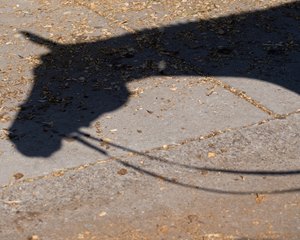New York Lawmakers Move Bills Forward to Protect OTTBs


State lawmakers in the two legislative houses in New York State have passed dueling bills pertaining to how retired racehorses are treated when they are done racing.
In the Democratic-controlled state Senate, a bill was approved July 21 banning the slaughter of retired racehorses.
In the Democratic-controlled Assembly a day earlier, lawmakers OK'd a measure to create a mechanism to track the whereabouts of New York-bred racehorses after they have stopped racing.
Which bill, if either, gets final approval will be made clear sometime later this week when the New York State Senate and Assembly wrap up another phase of its 2020 session in Albany.
On Monday, the Assembly OK'd a bill sponsored by Assemblyman Gary Pretlow, a Westchester Democrat, creating a new, seven-member state commission charged with the oversight of retired Thoroughbred and Standardbred racehorses. The bill includes a tracking requirement on where the horses go—if they remain in New York State—after their racing years are complete.
"We can only keep track of horses that start their lives in New York and remain in New York,'' Pretlow, chairman of the Assembly racing and wagering committee, told his colleagues during a floor debate on the bill.
The bill does not ban the slaughter of retired racehorses, but Pretlow said the bill will go a long way to ensure that the horses "aren't shipped off to Canada where they go into the food chain and become part of the menu at French dining tables."
The bill, which died in the Assembly last year but was passed in the Senate, is sponsored in the Senate by Senator Joseph Addabbo, a Queens Democrat who chairs that chamber's racing, gaming, and wagering committee.
But the Senate on Tuesday passed a different version—also sponsored by Addabbo in the Senate and also by Pretlow in the Assembly. That bill bans the slaughter of race horses and race horse breeding stock, making it specifically unlawful in New York to kill horses after they have retired from racing "for a commercial purpose."
"The purpose of this legislation is to ensure the prohibition of inhumane slaughter of retired race horses and breeding stock,'' states a bill memo from the sponsors in the support of the legislation.
The measure also steers money collected from enforcing civil penalties authorized under the bill into aftercare programs for retired racehorses and allows New Yorkers to make voluntary donations to those programs through their annual state income tax filings. It also requires the microchipping of all racehorses so state racing regulators can track the horses after they retire from racing.
"Every stakeholder in the horse racing industry shares the responsibility of ensuring safe and healthy lives for race horses after they have retired. The Thoroughbred racing industry, in particular, has taken major steps towards this effort, but the State has an obligation to ensure greater participation,'' states the bill's memo from the sponsors.
In an interview Wednesday, Addabbo said his slaughter ban bill "is a better, more comprehensive bill" than the legislation he and Pretlow sponsored creating a commission to track the whereabouts of some retired racehorses. The slaughter ban bill provides a funding mechanism for aftercare programs for the retired horses and implants chips to track all retired racehorses.
"We have a little window of time here,'' Addabbo said of this week's session that is due to end Thursday. If a deal can't be reached this week, Addabbo expects an agreement could still come together in 2020 if lawmakers, as expected, reconvene session in the weeks or months ahead to take up COVID-19-related matters.
